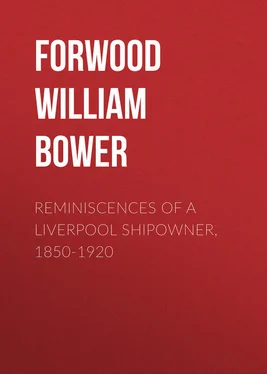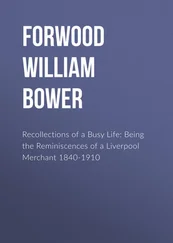William Forwood - Reminiscences of a Liverpool Shipowner, 1850-1920
Здесь есть возможность читать онлайн «William Forwood - Reminiscences of a Liverpool Shipowner, 1850-1920» — ознакомительный отрывок электронной книги совершенно бесплатно, а после прочтения отрывка купить полную версию. В некоторых случаях можно слушать аудио, скачать через торрент в формате fb2 и присутствует краткое содержание. Жанр: foreign_antique, foreign_prose, на английском языке. Описание произведения, (предисловие) а так же отзывы посетителей доступны на портале библиотеки ЛибКат.
- Название:Reminiscences of a Liverpool Shipowner, 1850-1920
- Автор:
- Жанр:
- Год:неизвестен
- ISBN:нет данных
- Рейтинг книги:5 / 5. Голосов: 1
-
Избранное:Добавить в избранное
- Отзывы:
-
Ваша оценка:
- 100
- 1
- 2
- 3
- 4
- 5
Reminiscences of a Liverpool Shipowner, 1850-1920: краткое содержание, описание и аннотация
Предлагаем к чтению аннотацию, описание, краткое содержание или предисловие (зависит от того, что написал сам автор книги «Reminiscences of a Liverpool Shipowner, 1850-1920»). Если вы не нашли необходимую информацию о книге — напишите в комментариях, мы постараемся отыскать её.
Reminiscences of a Liverpool Shipowner, 1850-1920 — читать онлайн ознакомительный отрывок
Ниже представлен текст книги, разбитый по страницам. Система сохранения места последней прочитанной страницы, позволяет с удобством читать онлайн бесплатно книгу «Reminiscences of a Liverpool Shipowner, 1850-1920», без необходимости каждый раз заново искать на чём Вы остановились. Поставьте закладку, и сможете в любой момент перейти на страницу, на которой закончили чтение.
Интервал:
Закладка:
William Bower Forwood
Reminiscences of a Liverpool Shipowner, 1850-1920
PREFACE
The following sketches were contributed to the Liverpool Press ( Liverpool Daily Post , Liverpool Courier , Journal of Commerce ), and they are now published at the request of many friends. Advantage has been taken of the opportunity for revision, and to add further reminiscences.
A chapter has also been added descriptive of the part played by the British merchant seaman in the war; and another, published in 1917, portraying the attitude and work of the British shipowner during the war.
To do adequate justice to the history of our shipping during the past sixty years would occupy several volumes. In the following pages all that has been attempted has been to outline the principal events in the fewest possible words, in the hope that they may serve for future reference; and also keep alive that interest in our mercantile fleet which is so essential to the prosperity of our Country and the welfare of our people.
Bromborough Hall, Cheshire,
August, 1920 .
Chapter I
THE PASSING OF THE SAILING-SHIP
The old sailing-ship, with all the romance which surrounds it, must long linger in the affectionate regard of all British people as the creator of our great overseas trade and the builder-up of our commercial prosperity. The sailing-ship was the mistress of the seas for centuries. She founded our maritime supremacy, was the conveyor of the first fruits of our manufacturing industry to the ends of the world, and enabled us to train a race of sailors unequalled for their skill, courage, and patriotism, who in times of national peril have protected our homes and safeguarded the freedom of the world.
Liverpool owes her greatness as a city and her position as the first port in the world to her shipping. Possessing the only deep-water haven on the West Coast, she naturally became the port of shipment for the manufactures of Lancashire and Yorkshire directly our export trade began to develop. The beginnings of the shipping trade were small, for in 1751 there were only 220 vessels belonging to the port. The opening up of the American trade in 1756 gave a great impetus to shipping. It was destined, however, to receive a serious check by the world-wide war which started in 1756, and was waged almost continuously for sixty years.
The first of this long series of wars known as the Seven Years’ War (1756-1761) was followed by twelve years of peace, and it was during this time that our trade with America made its greatest headway. The War of Independence with America, which broke out in 1773, proved most disastrous to Liverpool. It paralysed our trade and there was dire distress in the town. It is recorded: “Our docks are a mournful sight, full of gallant ships laid up and useless.” This unhappy war lasted seven years.
But perhaps the most terrible period for our shipping was in 1810, when America, feeling herself “crushed between the upper and the nether millstone of Napoleon’s mastery on land and England’s supremacy by sea,” declared war and threw her strength into privateering. The result to the trade of Liverpool was most disastrous. The number of ships entering the port fell from 6,729 in 1810 to 4,599 in 1812. When, in 1815, peace was again brought about, there was a most rapid recovery in business in every direction.
Our British arms which had been victorious in the great war on the continent of Europe had also made our country supreme at sea; foreign shipping had almost disappeared, and our shipping trade reaped an enormous advantage, our tonnage rapidly increasing.
The period from 1815-1860 may be termed the halcyon days of the British ship, and the period from 1850-1880 witnessed the “passing” of the sailing-ship. With the “passing” of the sailing-ship we have lost many interesting and attractive features. The attitude of the shipowner has entirely changed. His quiet, leisurely occupation has gone, and with it much that was picturesque and gave pleasure and enjoyment. With the advent of the steamer a new era opened up, characterised by the hustle of increased activity. Speed is the criterion aimed at, calling for constant and strenuous work.
The shipowner of the olden days had time to take a deep personal interest in the upkeep of his ship. He strolled down from his office almost daily to the dock where she was lying. Of the sixty-four sixty-fourth shares into which the ownership was divided he probably owned at least one-half; this gave him a very real concern in his ship’s welfare. He watched and supervised her construction with the same solicitude as he would the building of his own house. And when completed and she took up her loading berth in the Prince’s or Salthouse Dock, all fresh painted, the rigging tarred down, the ratlines all taut and evenly spaced, every rope and hawser carefully coiled down and in its place, it was excusable if the owner viewed his ship with some pride. A large poster displayed in the ship’s rigging announced the port for which she was taking cargo and the date of sailing – a date which was never kept. She remained in dock week after week while her cargo gradually trickled down.
This long delay involved a loss of interest and earning power, and also a serious loss of interest to the owners of cargo shipped by her. Mr. Donald Currie, when he left the Cunard Company, made up an ownery for five or six ships for the Calcutta trade, and was anxious that Jardine, Skilmer & Co., of Calcutta, should take the agency at that port. But they had suffered so much from the delay of their cargoes that they made it a condition of their acceptance that Mr. Currie should strictly adhere to his advertised dates of sailing; and certainly he had no cause to regret it, for practically Jardines loaded his ships with their own goods, and Mr. Currie’s fleet rapidly increased. This was the beginning of fixed days of sailing from Liverpool, which are now almost universal.
Although the pleasure of a shipowner was more personal and greater in the days gone by, it was accompanied by much anxiety, and the risks were greater than those of to-day. A wooden ship was liable to decay, and the periodical surveys by Lloyd’s were times of much concern. They might expose some defect which might involve the stripping and rebuilding of the part affected. The highest class at Lloyd’s A1 for thirteen years, soon ran out, and the continuation of the class always involved many repairs.
The preparation of a captain’s instructions prior to the commencement of a voyage entailed much thought; every contingency had to be provided for; there were no “cables” by which subsequent instructions could be sent, or the owner consulted.
Cargoes at the loading ports were uncertain, and the change of ports in ballast had to be provided for. The most carefully-worded instructions often failed to provide for the very contingency which happened, or more frequently the captain did some stupid thing. The owner was in dread lest his ship should find no homeward cargo and have to shift ports, or lest she be damaged or dismasted, and put into some remote port not contemplated in his instructions. He had visions of heavy repair bills and bottomry bonds.
Sailing-ship owning was profitable to those who possessed high-class ships, but I cannot recall many fortunes made out of soft wood ships, the cost of their maintenance and repair being so heavy.
In a brief résumé of the history of the sailing-vessel it is not necessary to pass in review the early steps taken in the evolution of a ship, for shipowning did not assume a position of any importance before the year 1600, when, during the reign of Queen Elizabeth, the East India Company was founded.
Читать дальшеИнтервал:
Закладка:
Похожие книги на «Reminiscences of a Liverpool Shipowner, 1850-1920»
Представляем Вашему вниманию похожие книги на «Reminiscences of a Liverpool Shipowner, 1850-1920» списком для выбора. Мы отобрали схожую по названию и смыслу литературу в надежде предоставить читателям больше вариантов отыскать новые, интересные, ещё непрочитанные произведения.
Обсуждение, отзывы о книге «Reminiscences of a Liverpool Shipowner, 1850-1920» и просто собственные мнения читателей. Оставьте ваши комментарии, напишите, что Вы думаете о произведении, его смысле или главных героях. Укажите что конкретно понравилось, а что нет, и почему Вы так считаете.






![William Frith - John Leech, His Life and Work. Vol. 1 [of 2]](/books/747171/william-frith-john-leech-his-life-and-work-vol-thumb.webp)

![William Frith - John Leech, His Life and Work, Vol. 2 [of 2]](/books/748201/william-frith-john-leech-his-life-and-work-vol-thumb.webp)



